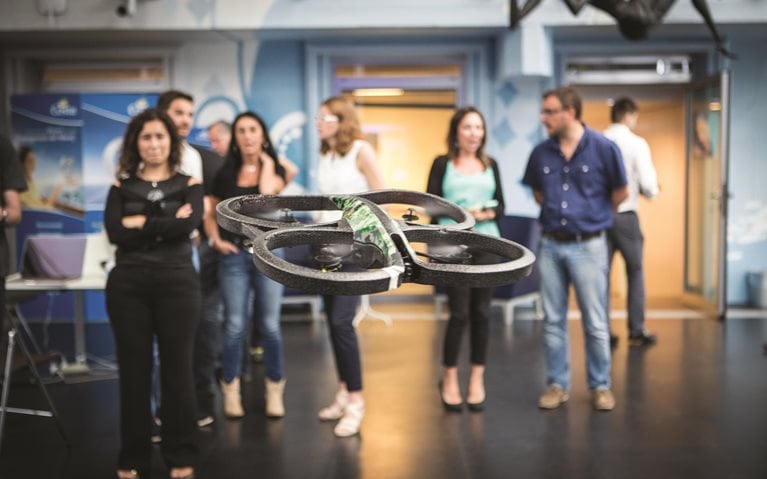It’s long been said that three things matter in real estate: location, location, location. But based on trends that have been reshaping other industries, competition in real estate has spread to another area: customer experience.
How engaged, productive, comfortable, connected, and safe we feel in our physical environment matters, and the COVID-19 crisis has accelerated the need for significant changes in the real estate industry. Practically overnight, for example, physical distancing and the need for contactless interaction have magnified the importance of digital within real estate.
Pioneers in the industry have been exploring ways to diversify sources of revenue, pursuing new digitally-enabled business models and focusing on tenant experience. The pandemic has made clear that those that haven’t yet made such investments in underlying capabilities and infrastructure will need to catch up quickly.
RXR Realty, a North American real estate investor and developer, began working on this topic long before the COVID-19 crisis. Partnering with a team of Business Building colleagues, who specialize in helping established organizations build and scale innovative new businesses and ways of doing business, RXR worked to reimagine the tenant experience across its residential, commercial, and mixed use properties. They established a lab of more than 25 data scientists, designers, engineers, and product managers, who worked together to develop digital capabilities that catalyzed the reinvention of the company, helping it emerge as a beacon of change for the industry.

Let’s build the next big thing—together
Using our proven playbook, we help turn your next corporate venture into outsized growth
“The future of real estate is no longer about delivering four walls to tenants,” says RXR CEO Scott Rechler. “Instead, it’s about creating a unique, personalized customer experience that fosters meaningful interactions, collaboration, productivity. Delivering this will require a unique combination of capabilities that seamlessly integrate across the physical and digital realms.”
The joint McKinsey Business Building-RXR team has built products and services for residents that enhance their living experiences. One innovation is a new RXR app that is anchored around a resident experience officer. Designed, created, and launched by the team, the app allows residents to manage elements of their personal lives, like moving into an apartment, and use digitally-enabled concierge services for services like housekeeping and grocery delivery. Tenants can also submit and manage maintenance requests through the platform and make rent payments seamlessly.
The entire experience is powered by a robust data and analytics infrastructure that is uniquely tailored and personalized, and enables staff to manage buildings in a customer-centric way. “There’s a huge opportunity to get more use out of data that these digital products create,” says Vaibhav Gujral, a McKinsey partner. “We can uniquely personalize services and experiences to tenants based on information that is made available at the right place at the right time.”
Real estate is no longer just about four walls and relying on location for value appreciation.
On the commercial office side, RXR is implementing new technologies to help monitor energy efficiency and environmental conditions. As companies consider what office space will look like in the return to work after coronavirus, these capabilities have positioned RXR to move with agility. For instance, the infrastructure created by RXR with McKinsey Business Building’s support enabled the company to respond quickly to the coronavirus, including the launch of a new comprehensive, data-driven program initiative called RxWell. “Helping to ensure an environment that prioritizes safety and wellness is particularly important in light of the coronavirus,” Rechler adds.
McKinsey Business Building, according to McKinsey partner Jennifer Kilian, is all about bringing start-up thinking to established organizations. “In this case, that meant working with RXR to build its digital muscle,” she says. Jennifer explains that for any business to change how it creates value for customers, a diverse set of skills is needed across design, data science, advanced analytics, and business.
The McKinsey Business Building team helped RXR determine which new roles to create and hire for. After outlining the criteria, they sourced and filled positions like software developers, data scientists, and agile coaches to ensure that the capabilities would live on beyond the initial phases of the project. Through our partnership, the company has built proprietary digital capabilities which are especially unique in the real estate industry, which will enable the organization to move with speed and agility.

Building new businesses: How incumbents use their advantages to accelerate growth
“Digital solutions have democratized access to experiences and conveniences for individuals and companies,” says Clay Cowan, a McKinsey partner. As people have grown accustomed to digital experiences like online banking, tele-health, or eCommerce for example, “they expect similar from the spaces in which they live, work, play, and shop.”
“We see this work as a catalyst for the rest of the industry across geographies,” says Aditya Sanghvi, a McKinsey senior partner. “Our aspiration is for this to set a new standard and benchmark for how real estate developers, owners, and operators start to think creatively about how they can create better experiences for their customers.”
